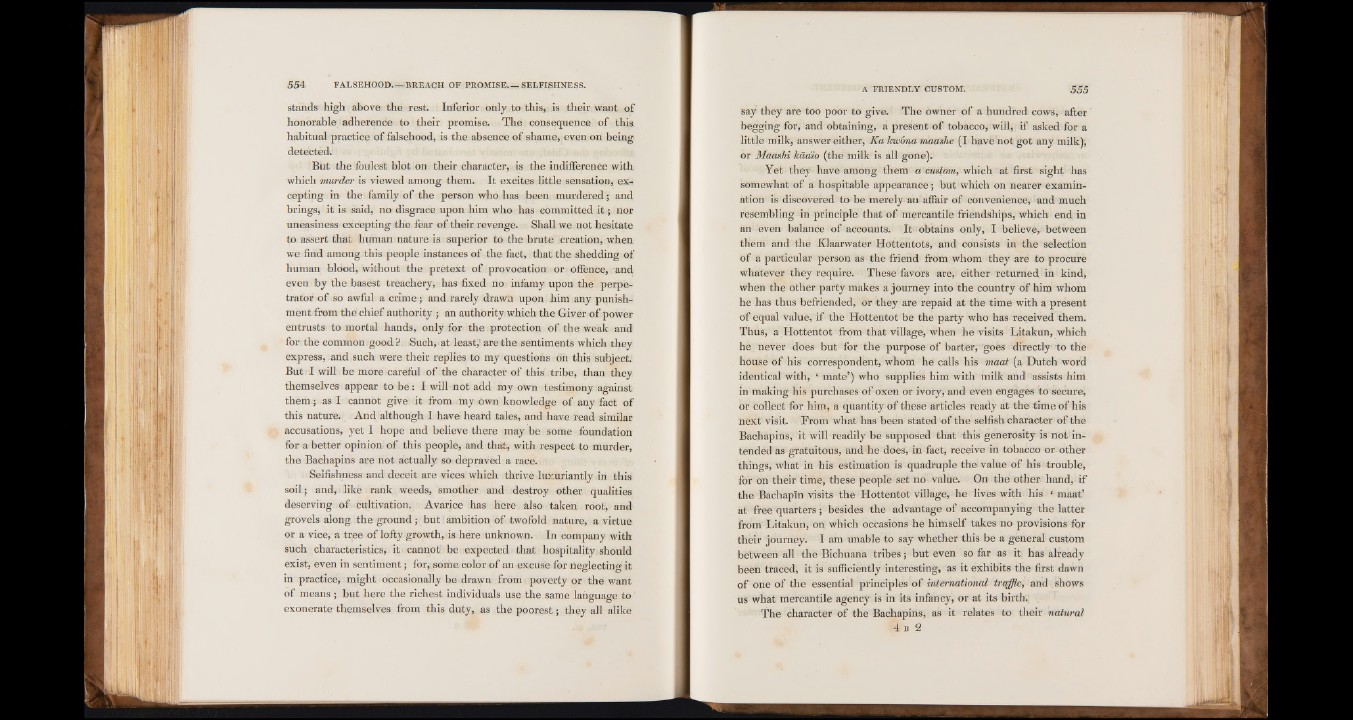
5 54 FALSEHOOD BREACH OF PROMISE SELFISHNESS.
stands high above the rest. Inferior only to this, is their want of
honorable adherence to their promise. The consequence of this
habitual practice of falsehood, is the absence of shame, even on being
detected.
But the foulest blot on their character, is the indifference with
which murder is viewed among them. It excites little sensation, excepting
in the family of the person who has been murdered; and
brings, it is said, no disgrace upon him who has committed it ; nor
uneasiness excepting the fear of their revenge. Shall we not hesitate
to assert that human nature is superior to the brute creation, when
we find among this people instances of the fact, that the shedding of
human blood, without the pretext of provocation or offence, and
even by the basest treachery, has fixed no infamy upon the perpetrator
of so awful a crime; and rarely drawn upon him any punishment
from the chief authority ; an authority which the Giver of power
entrusts to mortal hands, only for the protection of the weak and
for the common good?., Suchj at least,1 aretha sentiments which they
express, and such were their replies to my questions on this subject.1
But I will be more careful of the character of this tribe, than they
themselves appear to be : I will not add my own testimony against
them; as I cannot give it from my own knowledge of any fact of
this nature. And although I have heard tales, and have read similar
accusations, yet I hope and believe there may be some foundation
for a better opinion of this people, and that, with respect to murder,
the Bachapins are not actually so depraved a race.
Selfishness and deceit are vices which thrive luxuriantly in this
soil; and,; like rank weeds, smother and destroy other qualities
deserving of cultivation. Avarice has here also taken root, and
grovels along, the ground; but ambition of twofold nature, a virtue
or a vice, a tree of lofty growth, is here unknown. In company with
such characteristics, it cannot be expected that hospitality should
exist, even in sentiment; for, some color of an excuse for neglecting it
in practice, might occasionally be drawn from poverty or the want
of means ; but here the richest individuals use the same language to
exonerate themselves from this duty, as the poorest; they all alike
A FRIENDLY CUSTOM. 5 55
say they are too poor to give. The owner of a hundred cows, after
begging for, and obtaining, a present of tobacco, will, if asked for a
little milk, answer either, Ka kwona maashe (I have not got any milk),
or Maashi kaaio (the milk is all gone).
Yet they have among them a custom, which at first sight has
somewhat of a hospitable appearance; but which on nearer examination
is discovered to be merely an affair of convenience, and much
resembling in principle that of mercantile friendships, which end in
an even balance of accounts. It obtains only, I believe, between
them and the Klaarwater Hottentots, and consists in the selection
of a particular person as the friend from whom they are to procure
whatever they require. These favors are, either returned in kind,
when the other party makes a journey into the country of him whom
he has thus befriended, or they are repaid at the time with a present
of equal value, if the Hottentot be the party who has received them.
Thus, a Hottentot from that village, when he visits Litakun, which
he never does but for the purpose of barter, goes directly to the
house of his correspondent, whom he calls his maat (a Dutch word
identical with, ‘ mate’) who supplies him with milk and assists him
in making his purchases of oxen or ivory, and even engages to secure,
or collect for him, a quantity of these articles ready at the time of his
next visit. From what has been stated of the selfish character of the
Bachapins, it will readily be supposed that this generosity is not intended
as gratuitous, and he does, in fact, receive in tobacco or other
things, what in his estimation is quadruple the value of his trouble,
for on their time, these people set no value. On the other hand, if
the Bachapin visits the Hottentot village, he lives with his * maat’
at free quarters; besides the advantage of accompanying the latter
from Litakun, on which occasions he himself takes no provisions for
their journey. I am unable to say whether this be a general custom
between all the Bichuana tribes; but even so far as it has already
been traced, it is sufficiently interesting, as it exhibits the first dawn
of one of the essential principles of international traffic, and shows
us what mercantile agency is in its infancy, or at its birth.
The character of the Bachapins, as it relates to their natural
4 b 2